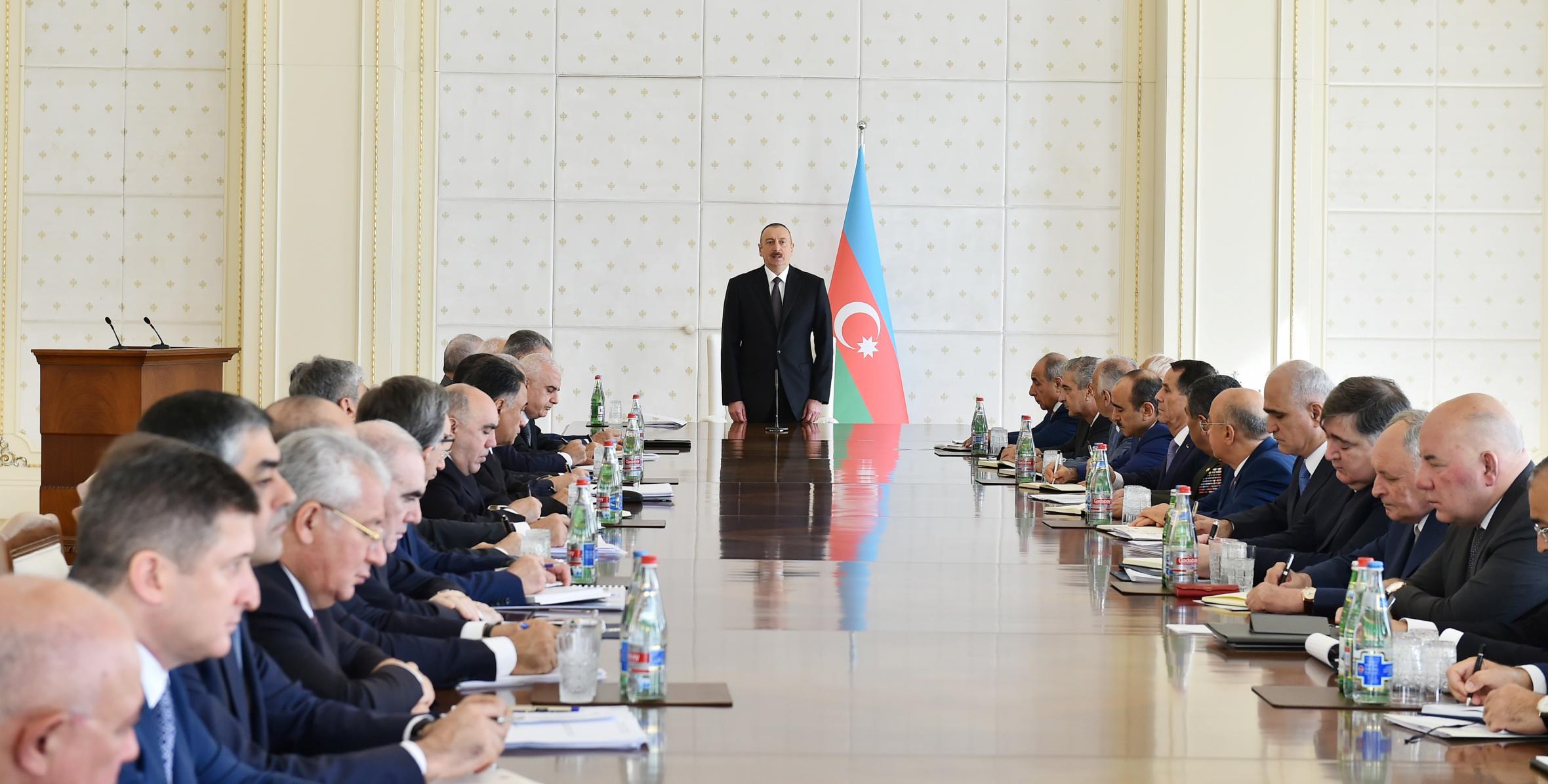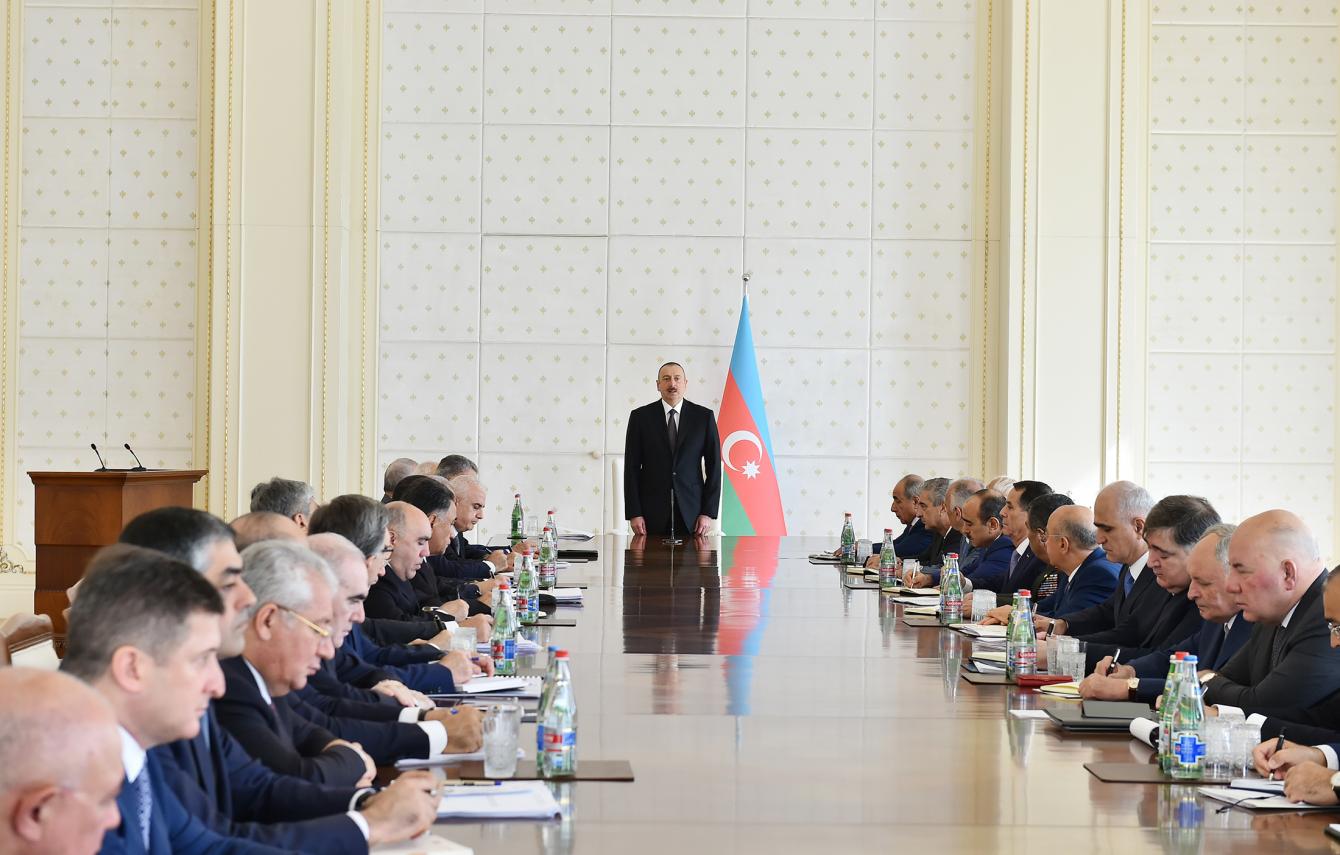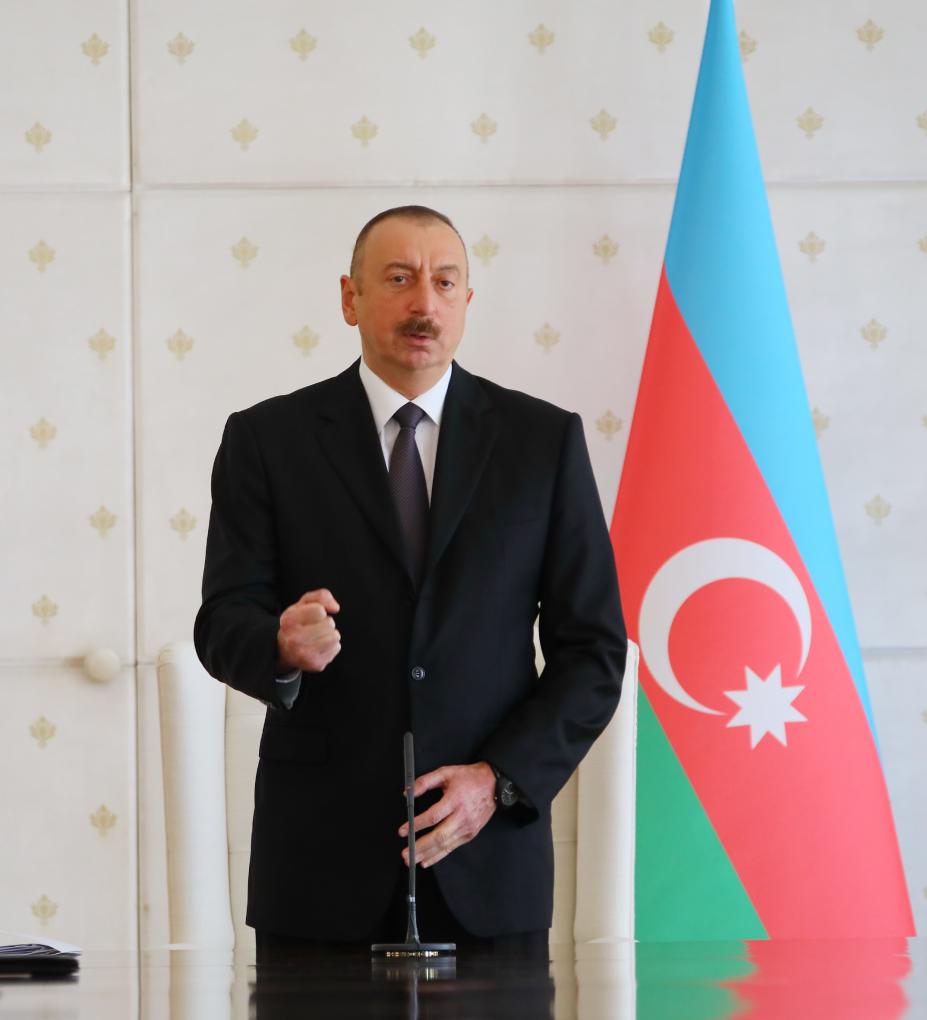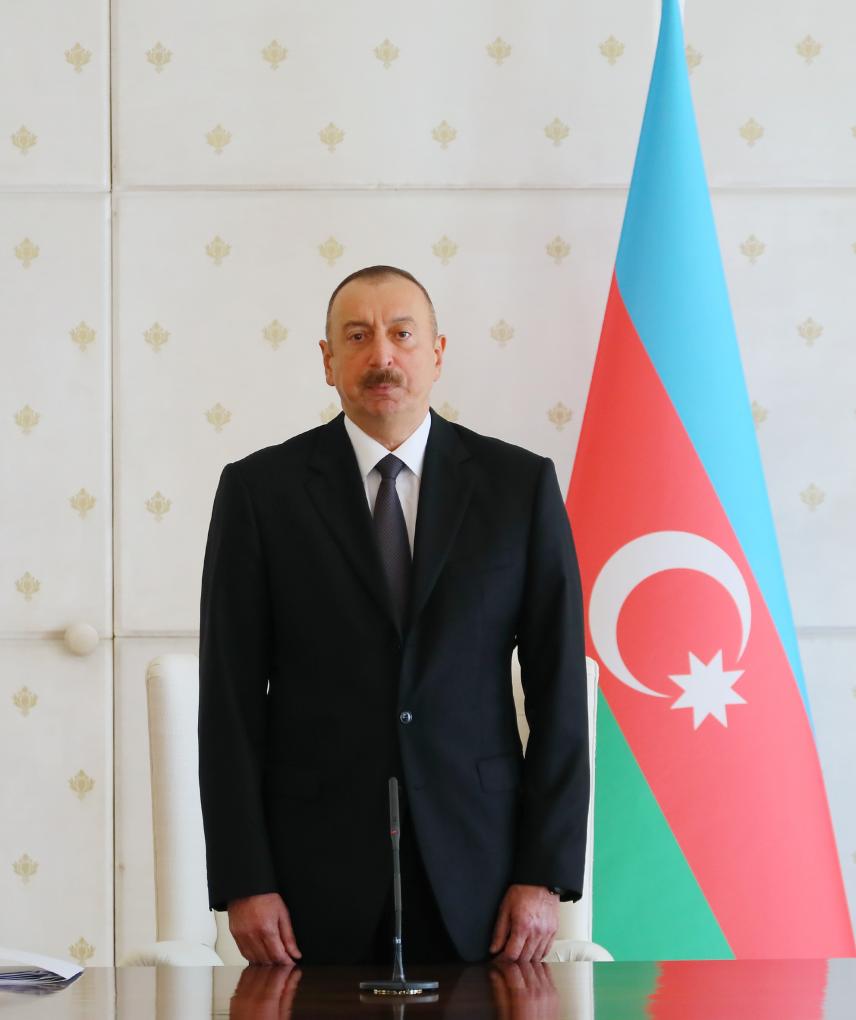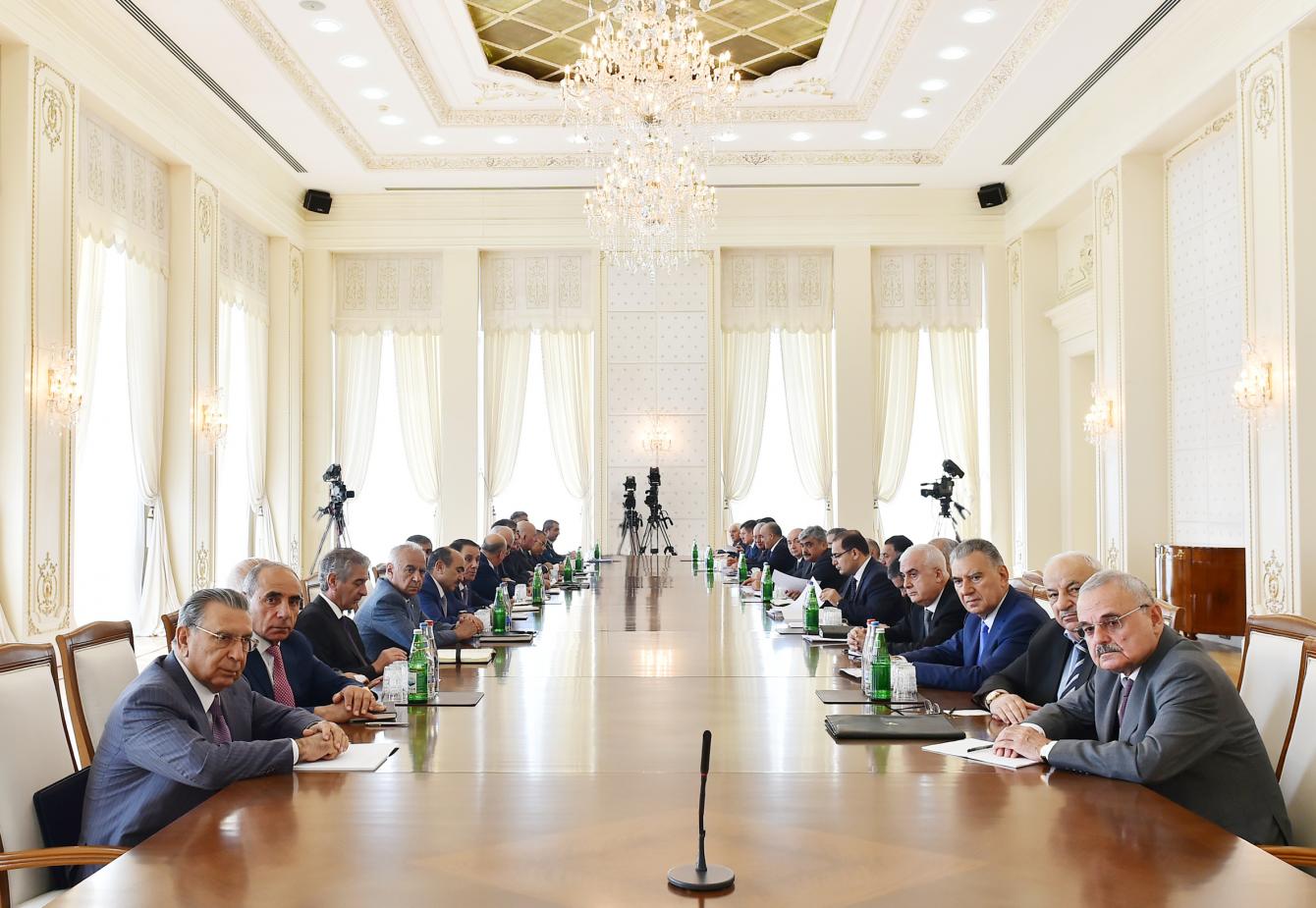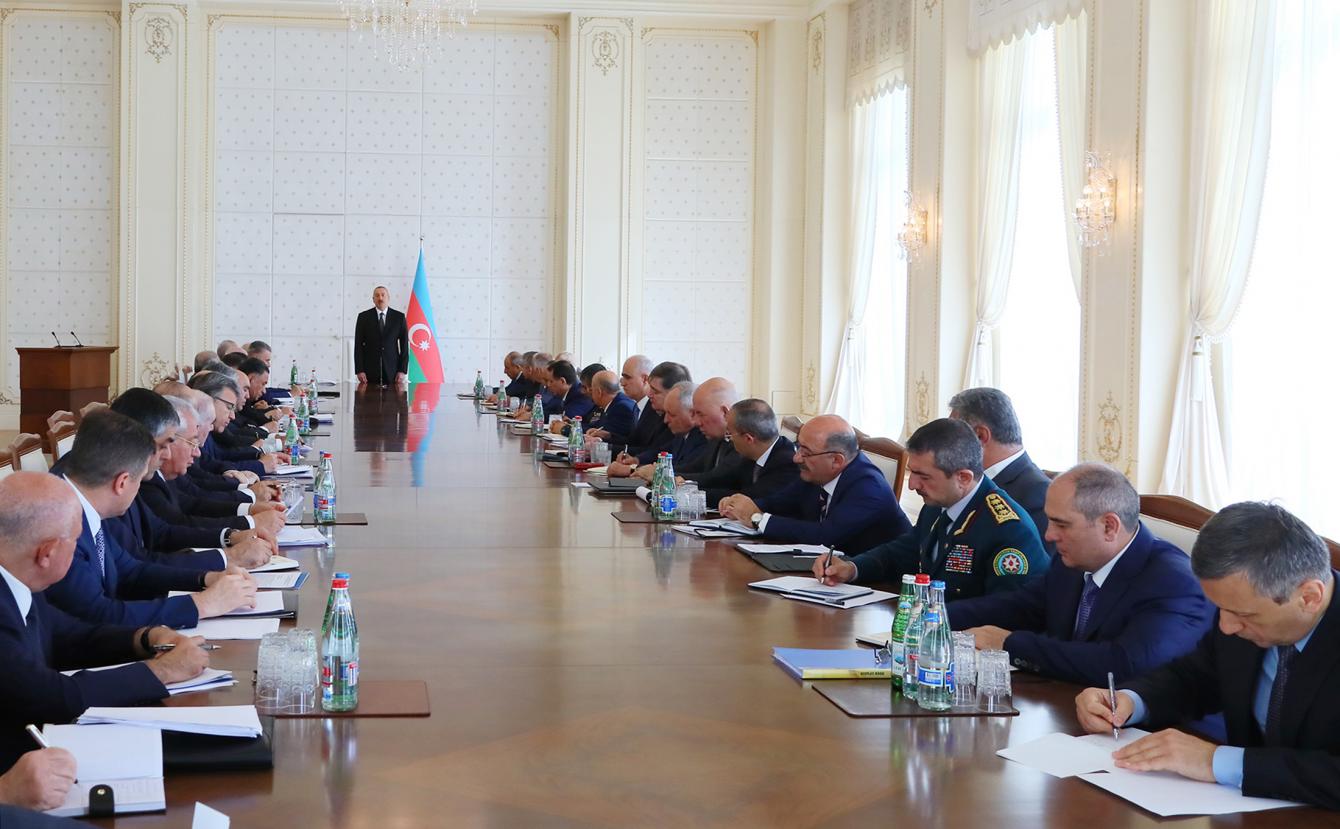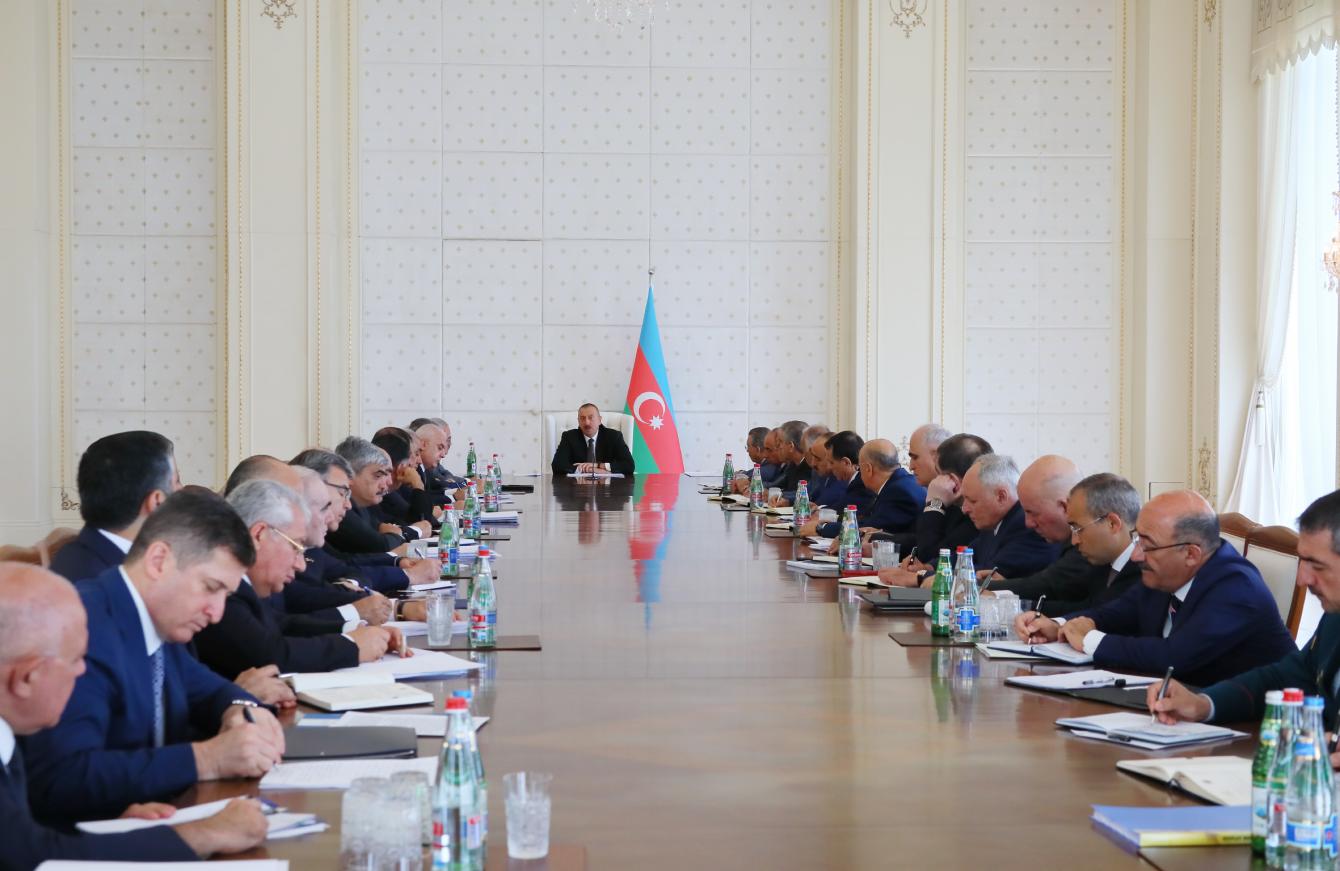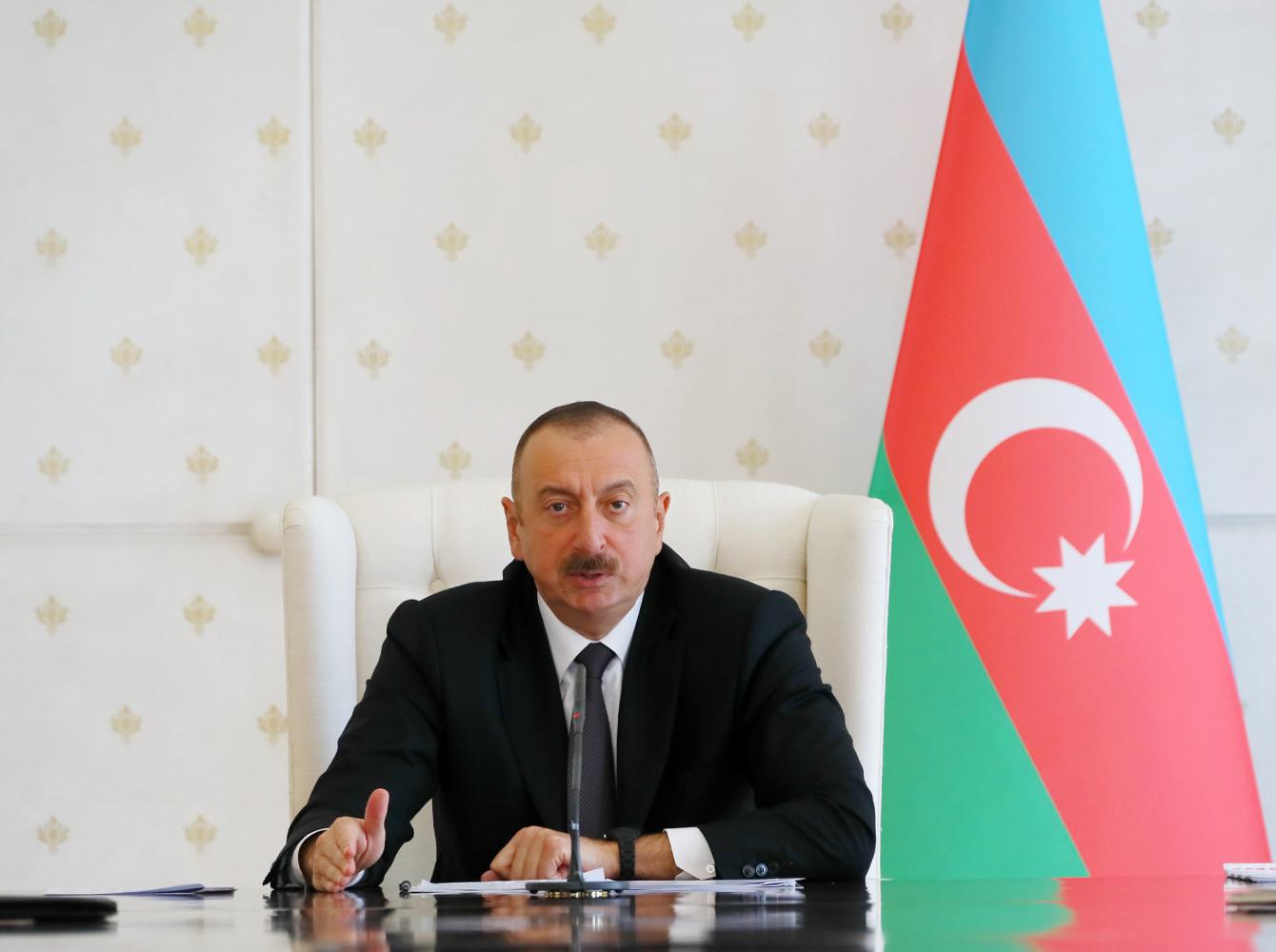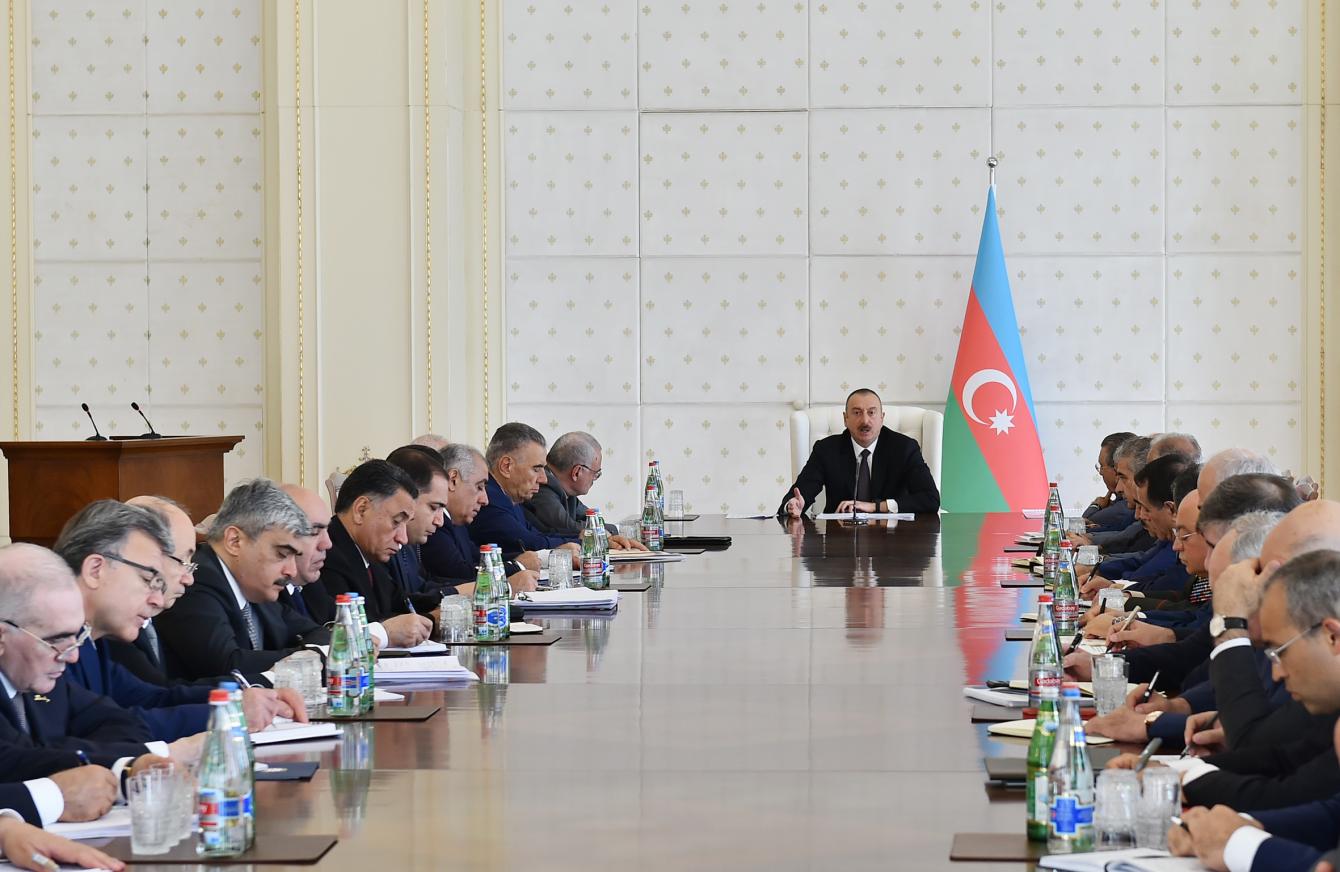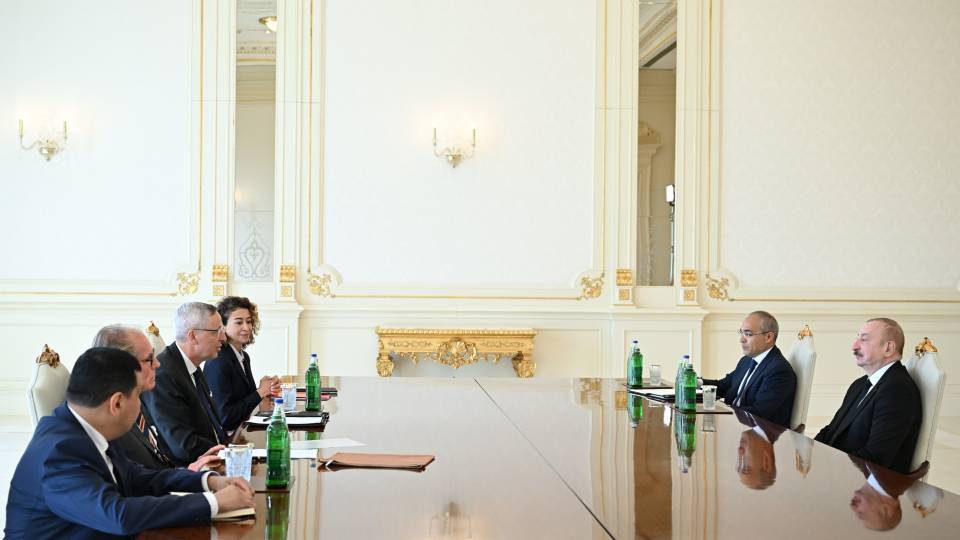President of the Republic of Azerbaijan Ilham Aliyev has chaired a meeting of the Cabinet of Ministers dedicated to results of socio-economic development in the first half of 2017 and objectives for the future.
The head of state made an opening speech at the event.
Opening speech of President Ilham Aliyev
- The first half of the year is now in the past. Today we will sum up the work done in six months and, at the same time, talk about objectives for the future. In general, Azerbaijan successfully developed in the first half of 2017. All our tasks have been met, our country has become even stronger and our international ties have deepened further.
Unfortunately, very dangerous trends in the world have kept intensifying in 2017. Both in our region and in the world, there are many issues of concern. Wars, conflicts, bloody clashes, crises – unfortunately, these are part of today's international panorama. Azerbaijan, for its part, is successfully developing. Stability in Azerbaijan is strengthening. The Azerbaijani people and the unity between the people and the government are the source of this stability.
All socioeconomic issues are successfully addressed in Azerbaijan. Security in our country is at a high level. Azerbaijan is recognized in this region and in the world as a place of stability. Of course, under such circumstances there is an interest in investment. At the same time, our people live in comfort and the well-being of our population improves. The Azerbaijani people build their future in the conditions of security and tranquility.
In the first six months of this year, our international relations have further expanded. Azerbaijan today is known in the international arena as a country worthy of great respect. The number of our friends is growing, and our activity in international organizations is very positive. In six months of the year, I have paid 10 foreign visits – five to European and five to Muslim countries. Azerbaijan was adequately represented at the leading global conferences on economics, politics and security held in Davos and Munich. At the same time, I had a very successful visit to the European Commission and paid official visits to France and Poland. As for Muslim countries, I have visited Iran, Qatar, Pakistan, Saudi Arabia and Turkey. Azerbaijan is expanding and strengthening its ties with all the countries I have paid visits to. In fact, the geography of these visits once again confirms how correct our foreign policy is and that it serves national interests. Along with this, in the first half of this year, the heads of state and government of nine foreign countries have visited Azerbaijan. This is also an excellent indicator.
This year, Azerbaijan has hosted several high-profile international events. Of course, the hosting of prestigious international events is important for any country. In essence, such events reflect the attitude and respect for the country. The representational events held in Azerbaijan are top-level events. I would like to mention the main ones. This year Baku hosted the Fifth Global Forum. This is already a very important and prestigious event on a global scale. Whereas Davos focuses more on economic issues and Munich on security issues, the Baku Global Forum discusses political and all other issues. The forum was joined by heads of state and government of several countries, famous politicians and public figures. The Global Forum has already earned itself a worthy place on the world map.
The Fourth Forum on Intercultural Dialogue took place this year. This event was also first held on our initiative several years ago. The organizers of this year’s event, along with Azerbaijan, included six leading international organizations of the world. The discussions held and decisions made at the Forum, of course, serve to strengthen multicultural values. Within the framework of the Forum, Azerbaijan once again asserted itself as one of the centers of multiculturalism. Of course, the fact that such events are held in our country enhances our international authority. At the same time, these events contribute to the positive processes in the world.
The Fourth Games of Islamic Solidarity were held in Baku this year. This is also a global event. We have held both the European Games and the Games of Islamic Solidarity at the highest level. Thousands of athletes and visitors got acquainted with our beautiful Baku and were fascinated by our city and country. Our capacity to organize major events is also at the highest level. The most important thing is that the national team of Azerbaijan managed to finish first at these Games. This shows again that Azerbaijan is a strong sporting nation. Azerbaijan finished in second place at the European games and in first place in the Games of Islamic Solidarity. As for the Olympic Games, Azerbaijan finished in 14th place on a global scale in terms of the number of medals won in the last Olympic Games.
The 24th Caspian Oil and Gas Exhibition and Conference was held this year. This exhibition and conference is one of the high-profile events in the energy sector on a global scale. An excellent indicator of this is that the President of the United States of America, Mr. Trump, sent a message to this event. The message addressed to me, of course, enhances the importance of the "Caspian Oil and Gas" exhibition and conference and, at the same time, represents further of the United States of America for the successful energy projects being implemented by Azerbaijan. Of course, such a kind attitude creates a new basis for the successful development of US-Azerbaijani relations. My meeting with the US Secretary of State in Istanbul a few days ago once again confirmed our strategic ties. Today, US-Azerbaijani relations are entering a new stage.
The events held in our country – and I mentioned only the key ones – actually demonstrate the role Azerbaijan is playing in the world, our development and respect and sympathy for our country on the part of the international community and leading states.
The main issue of our foreign policy is the Armenia-Azerbaijan Nagorno-Karabakh conflict. Unfortunately, no progress was achieved in this direction, in the direction of talks, in the first half of this year. At the same time, I believe that important events related to the settlement of the conflict took place in 2017, and Azerbaijan's fair position became even more valuable.
I would like to bring some facts to the attention of the Azerbaijani public. First of all, the self-proclaimed separatist regime incited by the political leadership of Armenia held another contrived and illegal "referendum" in Nagorno-Karabakh this year. As a matter of fact, this "referendum" is their big mistake, or rather their stupidity. If they were a little smart, they would never have gone for it. It was always clear that the world community would not recognize this far-fetched event. And so it happened. The Minsk Group issued a statement. Its co-chairs – America, France and Russia – did not recognize the "referendum". The European Union did not recognize the "referendum". Neighboring countries Iran and Georgia did not recognize the "referendum". Other countries also made similar statements. The non-recognition of this contrived "referendum" once again confirms that Nagorno-Karabakh belongs to Azerbaijan. The whole world and countries directly involved in the settlement of the conflict have demonstrated by this attitude again that Nagorno-Karabakh is an integral part of Azerbaijan. This is true, this is historical truth and, of course, this truth was emphasized again. This was another disgrace for Armenia.
As you know, after the April events Armenia put forward several conditions for the resumption of the talks and openly declared this. I then saw again, I knew back then that this was another folly because sooner or later they would return to the negotiating table and once again lose the respect they never had. And so it happened. The foreign ministers of Azerbaijan and Armenia met yesterday. The negotiation process has been resumed. Azerbaijan has not accepted any conditions and the negotiations have resumed without any preconditions.
This is our position. We have always said that this should be the case. This is also the position of the Minsk Group co-chair countries. Therefore, the invader was forced to return to the negotiating table. The question now is about resuming substantive, meaningful and concrete negotiations soon. As a result of the negotiations, our lands should be liberated from occupation and the territorial integrity of Azerbaijan should be restored. This is our position. There is no other solution possible.
Armenia has always tried to disrupt the negotiations and, as pressure on them mounted, to resort to provocations. We know this well from recent history. Back in the late 1990s, a terrorist act was committed in the Armenian parliament, which served as a pretext for the then leaders of Armenia to disrupt the talks. So it happened. Immediately after the talks held in France in 2014, Armenia resorted to another military provocation, organized military exercises in Agdam District. Our positions were attacked by helicopters and the Azerbaijani army shot down one of them.
At the end of March 2016, the President of Armenia and I participated in the Nuclear Security Summit in Washington. Then the Armenian president came under pressured to resolve the issue as soon as possible. To disrupt the talks, the April events occurred and yet another provocation was committed against us. The Azerbaijani army gave the enemy a fitting response, as a result of which our flag today flies on the territories liberated from occupation in Agdara, Fizuli and Jabrayil Districts.
No negotiations had been conducted since that time, and pressure on Armenia kept growing. In order not to start negotiations, they committed another provocation last month. Our soldier was killed. The Azerbaijani army punished them again. As a result of a strike on the part of the Azerbaijani army, many invaders were killed. Another provocation occurred in the village of Alkhanli of Fizuli District on 4 July. This is a war crime. This is a manifestation of Armenian fascism, and Armenia received a response for this crime. This is unprecedented atrocity. The murder of small Zahra and her grandmother demonstrated to the whole world the ugly face of Armenian fascism.
This crime did not remain unanswered. The Azerbaijani public is aware of this although Armenia always tries to conceal its losses. However, it can’t hide all of its losses. The Azerbaijani army inflicted crushing blows on the enemy. As a result of these attacks, many invaders were killed. The blood of small Zahra and her grandmother did not remain unavenged. This will always be the case. What was this crime calculated for? First of all, this characterizes the nature of the political leadership of Armenia. It is impossible to expect anything else from the killer of the people of Khojaly, the killer of children and women. This is Armenian fascism, and the whole world should take it this way. This is in the first place.
Secondly, a meeting of foreign ministers was scheduled for 11 July. This date was known, but it was announced only in recent days. By committing this provocation, they were hoping that Azerbaijan would refuse to negotiate. We could have refused if we hadn’t given them a fitting rebuff. We answered them, killed the invaders, punished them, and then went to negotiations.
These are the key issues related to the Nagorno-Karabakh conflict. This is why I am saying that the positions of Azerbaijan have become even stronger this year. The war crime committed in the village of Alkhanli reverberated extensively in the world. Armenia saw that Azerbaijan has tremendous international support. All our bodies have worked very hard and promptly to communicate this information to the world community. State agencies, embassies, Diaspora organizations, public associations and our friends abroad raised their voices, and the hatred for Armenia and the fascist nature of its political leadership in the world increased even more.
As for the prospects for the talks, I want to say again that the negotiations are resuming, which is a positive development. The main goal is to resolve the issue as soon as possible, so that the territorial integrity of Azerbaijan could be restored. I am sure that it will be so. The territorial integrity of Azerbaijan has never been and never will be a topic of negotiations.
This year, as always, we have paid great attention to strengthening our military capacity. New weaponry and latest technology have been bought. In fact, we are buy hardware, weaponry and the latest equipment from various countries. Some have already been delivered, while the rest will be delivered in the future. This will further enhance our military potential. We can now destroy any target on occupied territories, but we must further strengthen our military potential. This is necessary and we have enough capacity to do that. Unlike poor Armenia, we are buying our military equipment at our own expense and also produce it in Azerbaijan. This year, two new military plants started operating in Azerbaijan. Today Azerbaijan largely provides itself with arms and ammunition, and also exports them to foreign countries.
As always, the problems of internally displaced persons were also the focus of attention this year. About 100 settlements were built in recent years. However, a special place among them is occupied by the village of Jojug Marjanli, which we opened this year. This is a historic event. This event is inscribed in our glorious history in gold letters. We have restored the village of Jojug Marjanli which was liberated from occupation. We have built 50 houses, a school and a mosque similar to the Shusha mosque, laid a road and established the entire infrastructure. Families are returning there. After the opening, I signed another executive order. Funds were allocated for the construction of another 100 houses, a medical station and other necessary facilities. I am sure that the village of Jojug Marjanli will be fully restored in the coming months, and life will fully return to this village.
Other projects are being implemented as well. A large settlement is being established in Tartar District. New settlements are being set up in the cities of Sumgayit and Baku. Apartments are being purchased for refugees and provided to them. Such initiatives are being put forward in Masazir, Sumgayit and Garadagh district. Among them, I would like to highlight the Garadagh project because it is innovation, a new initiative. It is a large settlement being built by the private sector. It will accommodate a thousand refugee families, and this is a perfect example.
Today, thanks to the conditions we have created in Azerbaijan, hundreds of thousands of entrepreneurs are expanding their activities. Our entrepreneurs have great opportunities. The social responsibility of entrepreneurs should also be at a high level. We have created these conditions for them. After all, if there were no stability and rapid development in Azerbaijan now, our entrepreneurs could not develop so well. At the same time, the state provides them with concessional loans and resolves their issues. I have repeatedly met with entrepreneurs. I meet with them several times a year, and they get full support. They, in turn, should be aware of their social responsibility. Therefore, the construction of a settlement of 1,000 apartments by entrepreneurs in Garadagh district is a very good initiative. I approve and welcome it. This should be an example for all entrepreneurs. I will continue to evaluate the activities of entrepreneurs, using, among other things, this indicator.
Of course, the solution of all these issues demonstrates the policy and intentions of our state again. Our policy is centered on citizens of Azerbaijan. Therefore, the solution of social issues is always in the spotlight. Serious steps have been taken over these issues this year. More than five million people underwent free medical examination this year. I do not know of another country that would implement the initiative to enable its people, the majority of the population, to undergo free medical checkup during a year.
The construction of social infrastructure facilities has been in progress. In the first six months of the year, we have built and repaired 26 medical institutions. More than twenty schools of modular type have been built. By the end of the year, their number must be brought to 100. Therefore, the solution of social infrastructure issues is always in the spotlight.
Of course, to achieve all these successes we must have a strong economic potential. I am very pleased with the performance in the first six months. Our non-oil economy grew by 1.7 per cent in six months. This is a very good indicator. I am underlining the non-oil economy because the overall economic indicator, i.e. the gross domestic product, is more associated with oil production and the price of oil. And that is changing. Therefore, this cannot be treated as the main factor for evaluating the work we are doing.
The 1.7 per cent growth in our non-oil economy is the result of our economic reforms. I think that this is a very good indicator in the current conditions. The greatest growth was achieved in the non-oil industry where growth constitutes 4.4 per cent. I believe that this is the best possible indicator demonstrating that the reforms and the policy we are conducting are producing results.
In six months of this year, $5 billion was invested in the country's economy. Today, investment is declining practically in all countries due to financial difficulties and problems. In Azerbaijan, however, investments continue to be made, and most of them are foreign. In other words, Azerbaijan is a very attractive country for foreign investors. Why? Not only because we have a good investment climate but also because Azerbaijan today is a place of stability, and investors put their money only in places where there is stability. The number of stable countries is sharply reducing. Therefore, I am sure that more foreign investors will come to Azerbaijan in the future.
Our foreign reserves have grown and now amount to $40.6 billion. This is also an excellent indicator because our foreign exchange reserves have grown by about $3 billion since the beginning of the year. The oil price has fallen sharply. Then it grew to a certain extent. There is a possibility that it will fall again. However, our foreign exchange reserves are growing. Why? Thanks to a thoughtful policy. We have never engaged in populism. We have always dealt with the long-term development of our country. We both economized and carried out reforms. We allocated funds only for projects of strategic importance. Of course, we have reduced imports and increased exports. There are no problems with the budget. Therefore, transfers from the Oil Fund into the state budget have dropped. Therefore, an increase of foreign exchange reserves by $3 billion in six months of the year is an excellent result.
This year, 122,000 jobs were opened, of which 101,000 are permanent. I should also note that 24,000 jobs were closed. This has both objective and subjective reasons. In fact, this is an ongoing process. However, when we look at the figures – 122,000 jobs opening and 24,000 closing – then, of course, we see that the process of job creation is going well. Therefore, our unemployment is at a low level.
Foreign trade indicators are also positive. In six months of this year, exports have increased by 36 per cent, and the most important factor here is non-oil export. Non-oil exports have grown by 27 per cent in six months. This is the result of our work. Along with this, imports have decreased by 15 per cent. The surplus is $1.9 billion. I think this is the most desirable result for any country. Agriculture also grew by 2.2 per cent.
These indicators – there is no need for any comments here – are the best on a global scale. This was achieved by a country that still depends on the energy factor, a country whose incomes in the past two years have declined three to four times. This is our policy, our work and the results achieved.
X X X
Speakers at the meeting included Minister of Ecology and Natural Resources Huseyngulu Baghirov, Chairman of the State Committee on Property Issues Karam Hasanov, and chairman of Melioration and Water Management Open Joint Stock Company Ahmad Ahmadzade.
The head of state made a closing speech at the meeting.
Closing speech of President Ilham Aliyev
- At the beginning of the year, I said that 2017 should be a year of economic development. And it happened. We can already say that. Of course, we still have to work hard in the coming months, and we will. However, the results already achieved and the figures I announced in the opening speech suggest that this year will be one of development. Last year was a year of economic and financial stabilization. This will be a year of development. I am sure that Azerbaijan will also increase its economic potential in the years to come.
To continue the successful economic reforms and our economic policy, of course, there must be financial and economic stability. This has been achieved. Since the beginning of the year, the macroeconomic situation has been stable. True, there was a rise in prices in the first months of the year. But prices have stabilized over the past months. Consumer prices should be under constant control to prevent artificial inflation. There is no reason for that because there is macroeconomic stability. The manat rate has been stable for several months already. The dependence on imports decreases and demand is met more due to local production. In a word, issues of macroeconomic stability, as always, will be in the spotlight, and I am sure that there will be no problem until the end of the year. I have already mentioned that our foreign exchange reserves are growing. The positive balance of foreign trade in six months is about $2 billion. Therefore, we have fairly large economic opportunities and foreign exchange reserves. In terms of foreign exchange reserves per capita, Azerbaijan is among leading countries. The ratio of foreign exchange reserves to the external debt of the state also keeps Azerbaijan in the forefront in the world. Our foreign exchange reserves exceed the external debt four to five times.
Priorities for the future remain unchanged. Our priority is non-oil sector development. The figures I have voiced are a reflection of this policy. Very serious steps are being taken. Programs are being implemented to develop industrial production and agriculture. The projects I introduced in the previous period as programs are already being implemented. The creation of industrial parks has been particularly successful. The number of residents in the industrial parks of Sumgayit and the volume of investments are growing, and the interest is also very large. Large industrial estates are being created there, and the state has implemented all the necessary infrastructure projects for its part.
There will be built nine plants in the Mingachevir industrial park. The operation of these plants will lead to the creation of more than 5,000 jobs. I look forward to the opening of the first plant at the end of the year, and Mingachevir will expand its capabilities as a large industrial city. Five plants are ready for start-up in the Balakhani Park. Two enterprises will start operating in the Neftchala industrial zone in the near future. On the island of Pirallahi, we have laid the foundation for two pharmaceutical factories. A land plot has already been allocated in the Masalli industrial zone, and an investment proposal worth more than 30 million manats has been submitted. This is already a wonderful manifestation of our work. I am sure that industrial zones will be created in all our regions in the near future, as I instructed.
In the agricultural sector, new agro-parks are developing at a rapid pace. This process has received major proportions scope. To date, 32 large farms have been created on our initiative and with financial support. Now 38 large agro-parks are being created. The private sector has taken our initiative very responsibly. The creation of 38 agro-parks in the near future will significantly enhance our export potential.
We have restored the glory of cotton-growing. The number of people interested in engaging in cotton-growing is growing. This creates good conditions to completely eliminate unemployment in cotton-growing districts. Whereas in 2015 only 35,000 tons of cotton were harvested, this figure reached almost 90,000 tons last year. Whereas cotton was sown on an area of 51,000 hectares last year, this year the area increased to 136,000 hectares. We have increased the acreage about three times. If we take the average yield of 20 quintals, we can expect 260,000-270,000 tons of cotton this year. There may be more and less. That depends on weather conditions, as well as maintenance. However, it is beyond doubt that we have been able to achieve a serious turnaround in cotton-growing. Cotton is a wonderful exportable product. It is marketed on world exchanges. At the same time, it serves as a resource base for the Mingachevir light industry park. We, of course, will try to export finished products.
Cotton is grown in more than 20 districts. I should note again that there is a very great interest in this traditional industry in these districts. This initiative of ours is highly appreciated.
We started to seriously engage in silkworm breeding last year. We almost lost this sphere in previous years. In 2015, slightly more than 200 kilograms of cocoons were harvested. The loss of this sector created major problems for us. The Sheki silk factory practically stopped operating. Hundreds of people used to work there. Also, the farmers engaged in sericulture lost these opportunities. Last year, we managed to achieve a major breakthrough in this sector. We imported the necessary materials and brought seedlings. 70 tons of cocoons were harvested last year. Look at the difference: 200 kilograms and 70 tons! This process continues. I am told that 244 tons of raw cocoon were harvested this year. So there is an increase of 3.4 times in comparison with last year. Sericulture develops in 30 regions and people are engaged in silkworm breeding in 739 villages. This is a very profitable sphere which does not require much labor. People earn good money in a short time and receive it on the spot. Therefore, the impetus we have given to the development of sericulture will to lead to great results, I am sure. Our natural conditions are such that silkworm breeding has good prospects in most places of our country. The government will continue to provide support. 4.5 million manats were allocated from the President's Contingency Fund this year on my instructions. The Gakh center of breeding sericulture will be established by the end of the year using these funds. There was such a center in Gakh before, but it is unserviceable and there is no equipment there now. A modern breeding center will be created there soon, so we could eliminate our dependence on materials and import.
The Sheki Silk Factory now operates to a large capacity. We must make sure that the Sheki Silk Factory works at full strength and the year round. The planted mulberry seedlings and our policies will, I am sure, lead to the harvesting of more than 1,000 tons of cocoons in Azerbaijan in the near future. Let me repeat that this has very great prospects. I do not want to voice figures at this stage, but the government has done its job well.
Along with this, we are also restoring tobacco-growing, most of which was practically lost. People are engaged in tobacco-growing in 13 districts. Compared with the previous year, tobacco acreage has increased by 35 per cent. Now tobacco is grown on an area of 3,200 hectares. This area can be even bigger because the 13 districts involved in tobacco-growing have fairly large land plots. Tobacco-growing is also a very profitable sector. The government provides its support and subsidies here as well. At the same time, the state demonstrates its capabilities in the exports of tobacco. As I mentioned before, of course, we should export tobacco, but it will be better if we export finished products. Work towards that is in progress. Steps are being taken to set up new tobacco factories. I do hope that these steps are successful and we will take our finished products to world markets.
Work is under way to revitalize tea-growing. True, Azerbaijani tea is known in foreign countries today. We do export tea. However, we must also know that we import raw materials. Therefore, by establishing new tea plantations and attracting modern technologies, we will be able to produce even more tea using domestic raw materials. New technologies can increase the yield several times. In the southern zone, there is very much interest in this area.
At the same time, rice cultivation is also becoming widespread in the southern zone. There is a huge interest in that as well. The state has purchased special equipment. After all, rice-growing is a sphere that requires a lot of work. To facilitate the work of farmers, modern machinery has been purchased and imported, so that rice-growing could develop without too much labor.
Information about the cultivation of olives has already been provided here. Last year, we exported 300 tons of olives. However, the export of olives may be at the level of $50 million. Our natural climate, conditions and traditions allow us to do this. We simply need to organize this work properly, and we are doing that. If necessary, new olive processing plants should be established. We should export the highest quality products to the markets of leading countries.
In my previous speeches, I noted that the biggest profit among agricultural produce comes from hazelnut farming. The area of our hazelnut gardens is about 30,000 hectares now, maybe a little more. We have set the task of establishing an additional 40,000 hectares of hazelnut gardens. This process is under way, and 18,000 out of 40,000 have already been planted. Of course, these gardens will yield in a few years. However, after these gardens yield, we can more than double the production of hazelnuts. Farmers are currently exporting hazelnuts worth $100 million and it will more than double, which will benefit both farmers and the state.
One of the most profitable spheres is potato-growing. Interest in this sector is also great. Unfortunately, we do not yet have large export potential. This varies from season to season. Looking at statistical indicators, I see that in some years we can’t meet our needs, while in others we do. Therefore, the development of potato-growing should also be a priority because potato farming is one of the most profitable branches of agriculture. This sector also needs special attention.
The development of animal husbandry will allow us to fully provide ourselves with dairy products and meat. We are getting there. However, the development of livestock breeding on the basis of modern technology and the breeding of cattle in closed conditions will save us land and the results will be better. Of course, the purchase of pedigree cattle, as well as the creation of an artificial insemination center, will cause a turnaround in this area. Growth in livestock production was more than 2 per cent. I should also note that among the 38 agricultural complexes created, there are cattle-breeding ones as well. I do hope that their operation will lead to major growth.
In 27 districts, sugar beet has been planted on an area of 14,000 hectares. This is a record figure. We have never planted so much sugar beet in Azerbaijan before. The main reason for this is the operation of the Imishli sugar plant based on local raw materials. We used to process the imported sugar cane more. Now sugar beet will be delivered to the Imishli plant. About $200 million is spent each year to import raw sugar. We will save on this. Thus, our imports will further decrease and exports grow. This sphere has great prospects. This is my instruction.
Some time ago, I issued an instruction associated with soy. In previous years, soybeans were not planted in Azerbaijan. We imported them. Every year we spend tens of millions of dollars on it. Therefore, I issued an instruction on growing soybeans, and we already see the results this year. Soybeans were planted on an area of 9,300 hectares in 19 districts,. This does not yet satisfy our needs, but we will save a lot of foreign currency. We should try to gradually expand the soybean acreage. At the same time, we plan to set up 500 hectares of almond orchards. If we consider that we have 1,000 hectares of almond orchards, of which 900 hectares are in the Nakhchivan Autonomous Republic, then 500 hectares at the first stage is a good indicator. It is necessary to envisage the construction of a factory to process almonds. This is also an instruction.
Issues related to grain-growing are always on the agenda. On my instructions, a special meeting was held at the Presidential Administration and these issues were analyzed. We must achieve better results in this area in order to reduce our dependence on imports and increase yields. I want to voice some figures related to the yield, so that they could be analyzed and the public could know what the situation is. In connection with wheat, I have to say that harvesting is still ongoing. To date, the average yield is 28.8 quintals. In principle, this figure is not too low but it can be higher. The figures I will voice now across the districts show that higher yields are possible. The highest yield is observed in the following districts: Saatli 42 quintals, Agjabadi 38 quintals, Sabirabad 40 quintals, Beylagan 33 quintals, Barda 40 quintals, Agdam 39 quintals, Hajigabul 32 quintals, Gakh 31 quintals, Khachmaz 32 quintals, Yevlakh 38 quintals, Tartar 38 quintals, Shamkir 33 quintals, Ismayilli 40 quintals, Gabala 32 quintals, Jabrayil 32 quintals, Ganja 32 quintals. These are good figures, and this gives us grounds to say that we can achieve even greater yields. However, there are some questions.
Now I will name the districts where the yields are low, and this issue should then be analyzed. The difference in yields in districts that are adjacent to each other should make us think about that. This should be analyzed. For example, in Kurdamir District the yield is 21 quintals, while in the neighboring Saatli it is 42 and in Sabirabad 40 quintals. Why such a difference?! It is one and the same zone, the same climate, the same conditions. As for irrigation, about the same projects are being implemented there. So far, I do not want to give an assessment to this. But my instruction is that this should be analyzed and the reasons reported to me. In Gakh District the yields are about 32 quintals, while in Sheki 22 quintals. Why? In fact, Sheki is second to Jalilabad for the size of arable land – it has 47,000 hectares of sown area – but the yields are 22 quintals. In the neighboring Gakh District it is 32 quintals. What is the reason? It is necessary to analyze this, report to me and take action.
I would also like to mention the districts with low yields. It is necessary to see whether we should envisage areas for wheat there at the same level in the future or give preference to other spheres. As I said, in Kurdamir Distyricts 21 quintals, Masalli 22 quintals, Ujar 23 quintals, Shamakhi 17 quintals. In Shamakhi, in fact, there is a plot of land of 14,000 hectares and, of course, we should see how expedient such yields are. In Gobustan District, the yields are 19 quintals, Shabran 21 quintals, Siyazan 23 quintals, Khizi 19 quintals, Yardimli 18 quintals, etc. Therefore, this should be considered and analyzed very seriously.
Reports have been made on land reclamation measures. At the beginning of the year, we set the task of organizing irrigation of more than 100,000 hectares of new lands, and work in this direction is in progress. We will achieve this. We are working on new projects. We must carry out irrigation at the highest possible level because this directly affects the yields. The drilling of sub-artesian wells continues. In 2013-2016, about 1,000 sub-artesian wells were drilled. In June, I signed a new order. Based on this order, 150 sub-artesian wells will be drilled in 150 settlements of 36 districts, which means that 375,000 people will benefit from that. Thanks to the wells drilled in previous years, 1,300,000 people benefited from these opportunities.
We are witnessing a revival in the construction sector. More than 100 high-rise buildings are under construction in Baku. New apartment blocks are being built in lieu of those in emergency condition. Their number is about 80. This makes our city even more beautiful and comfortable. People move out of unsuitable and run-down buildings. They are provided with money for temporary rent of housing. In the new buildings under construction, they will be provided with even bigger apartments. The first floors of the new buildings being built on the site of old ones, there are also kindergartens. This was my order. This alone will provide more than 80 kindergartens in the city of Baku in a year or two.
The State Housing Agency is constructing 29 buildings. Dozens of buildings have been constructed in the White City. In other words, more than 100 buildings are already under construction in these three directions. Of course, housing construction has become very widespread elsewhere in Baku and other cities. The construction sector is already recovering, there is a revival. Of course, this has a positive impact on the construction materials sector. I would advise business people to pay more attention to this sphere and invest, because construction in Azerbaijan will develop even faster from now on. There will be a great demand for construction materials.
I have voiced the figures related to investment - $5 billion has been invested. However, most of that is foreign investment. We should try to attract domestic investment. Speaking about domestic investment, I do not mean public investment. We are already doing that. The Public Investment Program is being successfully implemented, and it should be fully implemented. This includes the construction of schools, hospitals, the Baku International Trade Seaport, infrastructure projects, the construction of roads, etc. I mean private investment. Not only central bodies of executive authority are responsible for attracting private investment. I said this before and I want to say again that local executive authorities should be more active. To attract investment, especially in the regions, the heads of executive authorities should be proactive. In some districts there is activity and result, while in others these are absent. There is indifference. In some cases, instead of helping investors, they are creating problems for them. This must end. At the end of the year, in December, the Presidential Administration and the Ministry of Economy should provide me with information, a list of districts in which private investment has been attracted. The work of each head of executive authority will be evaluated also on the basis of this indicator. In one of the meetings, I also said that the performance of each head of executive authority will be evaluated, among other things, by this indicator. Let me say again: on 15 December, I must be provided with detailed information, after which both a high assessment and penalties will be awarded. I have repeatedly expressed my thoughts about the norms of conduct for civil servants. I want to say this again. The instructions I give when appointing a government official include the following: an official should be humble, serve the people, be with the people, not put himself above anyone. The official himself and his family members should not behave arrogantly. Despite this, we still see sometimes that officials can’t behave, make gross mistakes, while their family members believe that they have special privileges. No-one has privileges in Azerbaijan. I said that a government official who can’t manage his family members will be dismissed, and this is what happened. Those who engage in hooliganism and arbitrariness in Azerbaijan are and should be punished. No-one has concessions, and my recent decisions confirm this once again. Let everyone draw the right conclusions.
This year the implementation of infrastructure projects was continued. The level of gasification has already reached 93 per cent. We have set the goal of 95 per cent. If we take into account the terrain, I think this is a good figure. We are already achieving this goal. Other infrastructure projects are also being implemented. The electricity infrastructure is being updated. Rural road projects are being implemented. We have branded this project "40 rural roads", but the scope of each project is broader. In other words, we say 40, but in reality it covers 200, perhaps even more villages. Each project covers four to five villages, and this gives an excellent result. It is well received by people in the regions. Projects of drinking water are being implemented. There is enough money, and this process will be continued next year. In many of our cities the issue of drinking water has already been resolved.
Major road infrastructure projects are being implemented in the city of Baku. New roads are opening. A new road has also been opened recently. On the territory called "Sovetskaya", modern road infrastructure has already been commissioned. At the same time, a lot of work continues on this territory. The area in front of Tazapir Mosque is now open. There will be a park there. Public places will also be established in other places, so that Tazapir Mosque could be seen from everywhere. Behind the Azerbaijan State Drama Theater, on the territory where the road infrastructure is being created, there will be public areas, parks, squares, trees, etc. This will become, as they say, new "lungs" for the city of Baku. This area will be a zone of gardening, and this is very necessary for us. In recent years, many public places, parks and squares have been created. The boulevard itself is a major recreation area, and this process must be continued. The construction of a new building of the Haji Javad Mosque is under way. It should go faster so that this mosque could be opened in the coming months.
As I noted, work is under way to increase exports in the non-oil sector. The growth is good – 27 per cent. We also need to expand the geography of exports. There are traditional markets. We are present in these markets, but we should further strengthen our positions and access new markets. Work in this direction is already yielding results. We have now begun to export our agricultural and processing industry products to several countries of the Gulf. This needs to be expanded. The market of the Gulf countries is quite large and close to us in terms of the distance. Therefore, first projects have been launched. We have already started exporting our products. We should expand that. State bodies, the Ministry of Economy are helping entrepreneurs. We are already accessing the markets of Asian countries and should also try to enter the markets of European Union states. I raise this issue during practically all of my foreign visits and the visits of my foreign colleagues to Baku. I put a list before them and say: we can export these products and you are buying them anyway, so buy them from us, while we will purchase the products you export. We go to all our meetings with this list, and this produces excellent results. In Europe, the Gulf and Asian countries, there is interest in our products. They simply had no information until recently. The creation of the Azexport domain has also been a very serious step in this direction. The domain receives orders from all over the world now. Until recently, no-one knew what we were producing. They do know now, apply, and contracts are signed electronically. In other words, this is a huge event, and see how much easier it is for entrepreneurs to take such steps now. Trade missions are now being sent to all key market countries, and they include representatives of the public and private sectors. We must export our products abroad.
I want to voice some numbers now. It will be of interest to the public, and our businessmen and state bodies should know that these are good results. We must continue to work in this direction. I want to voice some figures related to the export of agricultural and processing products: this year the exports of tomatoes grew by 55 per cent, potatoes by 63 per cent, onions by 1,100 per cent, cotton by 154 per cent, cotton fiber by 650 per cent, dairy products by about 400 per cent, processing fruits and vegetables by 54 per cent, raw leather by 38 per cent, alcoholic and non-alcoholic beverages by 16 per cent, including wines by 13 per cent, apples by about 200 per cent, persimmons by 14 per cent, pomegranates by 106 per cent, tea by 50 per cent, chocolate by 50 per cent, tobacco products by 5 per cent, and animal and vegetable oils by 7 per cent. This is the result of the work done. Exports of industrial products: gold by 64 per cent, electricity by 300 per cent. We now sell electricity, and sold it worth $25 million in the first six months. Why? Because we have built power lines and connected them. We have high-voltage lines with all neighboring countries, and we export electricity. Export of aluminum grew by 30 per cent, plastic products by 22 per cent, equipment, mechanical devices by 50 per cent, copper by 67 per cent, copper ore concentrate by 100 per cent, tar oils by 56 per cent, bentonite clay by 255 per cent, textile products by 73 per cent, stone, gypsum, cement by 3 per cent, chemical products by 8 per cent, and lead by 123 per cent.
These are excellent indicators of the work done. Along with this, there are some goods the exports of which have declined. Everyone should also know that to study the reasons for the reduction and take action. For example, the exports of cherries and sweet cherries fell by 22 per cent, sugar by 11 per cent, hazelnuts by 9 per cent. Among industrial products, the only item registering reduction is ferrous metals and products made from them. These exports have dropped by 11 per cent. So the list of goods whose exports have decreased consists of three items, but look at how many products we have increased exports of and how much our capabilities have expanded. I have voiced these figures because these are excellent results and a good reflection of our work. At the same time, this is an example for the future. We must increase production on these positions and expand the geography of exports.
Entrepreneurs were provided with soft loans in the amount of 63 million manats in six months. In total, loans worth 2 billion manats have been provided on concessional terms. The mechanism of encouraging investment has fully justified itself. This was a very correct step. It was thanks to this initiative that investments of 1.6 billion manats were made in Azerbaijan. If there were no such mechanism, the investment of 1.6 billion manats would not have been made. We have done it. There were different opinions on this issue, but I said that we should go for it, and the result is obvious. There is no other factor that would bring us as much investment as the investment promotion mechanism. Therefore, entrepreneurs also appreciate this. Jobs are created and an excellent economic industrial potential is created. There is a mechanism to encourage exports which also has a good impact.
We are pleased with the development of tourism this year. The number of tourists has increased by 25 per cent. Of course, the reasons for this are well known. Azerbaijan is known better now. Azerbaijan is recognized in the world as a safe and stable country. The international competitions and events held in our country, of course, contribute to this interest. Among these competitions, I should mention Formula-1. The audience of this competition in the world is 500 million people. Five hundred million people see Baku and the beauty of our city. The sportsmen participating in this event in Baku, members of delegations and guests, of course, share pleasant experiences with their friends. Therefore, the flow of tourists will be even greater. We must be prepared for this. In particular, there is a great need for the construction of new hotels in Baku and the regions. I would advise entrepreneurs to invest in this sector because this is a profitable industry and will yield good results.
The last issue I want to note is also an innovation and a new initiative. This also has very great prospects and there are already good results. This is a self-employment program. We have recently started this program. I allocated initial funds from the President's Contingency Fund. The Ministry of Labor and Social Protection of the Population has conducted trainings and identified families. The government already provides financial support to many families and gives recommendations on how to build a family business so that they did not need targeted state assistance and could create good conditions for themselves. Relevant changes were made to the legislation. As a result of these changes, the Ministry of Labor and Social Protection of the Population will have its own funds from next year, and thanks to these funds we will be able to cover thousands of families with the self-employment program. I think that 5,000-10,000 families should receive this support from the state every year at the first stage. If the ministry does not have enough money for this, it should apply and I will allocate more. Thus, if we cover 5,000-10,000 families every year, unemployment, which is at the level of 5-6 per cent now, will be eliminated and there will be no need for targeted assistance.
So, I want to note again that the results of six months of this year are reassuring. Cabinet of Ministers meetings also serve to report to our people. We do this regularly. At the same time, my orders must be fulfilled so that we could increase the positive dynamics. Thank you.

